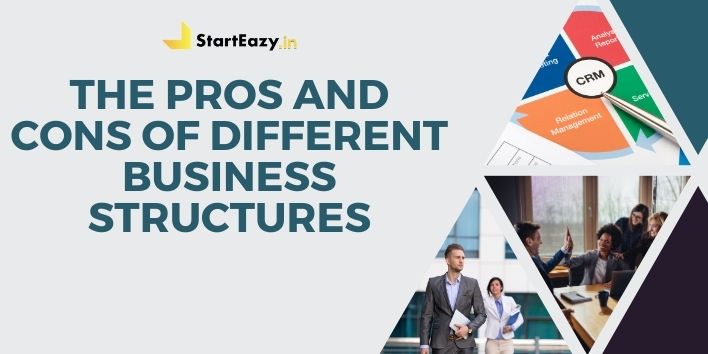The Pros and Cons of Different Business Structures

When starting a business in India, choosing the right business structure is crucial.
There are several options to consider, each with its own set of pros and cons.
In this blog, we'll explore the five most common business structures in India - Private Limited Company, One Person Company, Limited Liability Partnership, Partnership, and Sole Proprietorship - and examine the advantages and disadvantages of each.
We'll also discuss the importance of company registration online and how it can help protect your business.
Private Limited Company
A Private Limited Company is a popular choice for startups and small businesses.
It is a type of company that is privately held and has a limited number of shareholders.
The liability of shareholders is limited to the amount of their shares in the company.
Here are five pros and cons of setting up a Private Limited Company Registration Online:
Pros:
- Limited Liability: The shareholders of a Private Limited Company are only liable for the amount of their investment in the company. This means that their personal assets are protected in case of any legal disputes or financial losses.
- Separate Legal Entity: A Private Limited Company is a separate legal entity from its owners. It can own assets, enter into contracts, and sue or be sued in its own name.
- Easy to Raise Capital: Private Limited Companies can raise capital by issuing shares to investors. This makes it easier to attract funding from investors and lenders.
- Tax Benefits: Private Limited Companies are eligible for certain tax benefits, such as the ability to deduct business expenses and carry forward losses.
- Credibility: A Private Limited Company is seen as more credible and trustworthy than other business structures. This can help attract customers, suppliers, and investors.
Cons:
- Complex Compliance Requirements: Private Limited Companies are subject to several compliance requirements, such as maintaining proper accounting records, holding annual general meetings, and filing annual tax returns. This can be time-consuming and expensive.
- Limited Number of Shareholders: Private Limited Companies can only have up to 200 shareholders. This can limit the ability to raise capital and expand the business.
- Restricted Transfer of Shares: Shares in a Private Limited Company cannot be freely transferred or sold without the consent of the other shareholders.
- Higher Costs: The cost of setting up and maintaining a Private Limited Company can be higher than other business structures.
- Formal Decision-Making Process: Private Limited Companies are required to follow a formal decision-making process, which can be time-consuming and restrictive.
One Person Company
One Person Company (OPC) is a relatively new business structure in India that is designed for single entrepreneurs.
It allows for the creation of a separate legal entity with a single shareholder.
Here are five pros and cons of setting up an OPC:
Pros:
- Limited Liability: The liability of the shareholder is limited to the amount of investment in the company, protecting personal assets in case of any legal disputes or financial losses.
- Separate Legal Entity: An OPC is a separate legal entity from its owner. It can own assets, enter into contracts, and sue or be sued in its own name.
- Easy to Manage: Since an OPC has only one shareholder, it is easy to manage and make decisions.
- Tax Benefits: OPCs are eligible for certain tax benefits, such as the ability to deduct business expenses and carry forward losses.
- Credibility: An OPC is seen as more credible and trustworthy than other business structures. This can help attract customers, suppliers, and investors.
Cons:
- Limited to One Director: An OPC can have only one director, which can limit the ability to raise capital and expand the business.
- Limited to One Shareholder: An OPC can have only one shareholder, which can limit the ability to raise capital and expand the business.
- Complex Compliance Requirements: OPCs are subject to compliance requirements such as maintaining proper accounting records, holding annual general meetings, and filing annual tax returns. This can be time-consuming and expensive.
- Limited Growth Potential: Since an OPC can have only one shareholder, it can limit the ability to raise funds and expand the business.
- Less Credibility: An OPC may not be viewed as a credible and trustworthy business structure compared to a Private Limited Company or a Limited Liability Partnership, which can affect its ability to attract customers, suppliers, and investors.
Limited Liability Partnership (LLP)
A Limited Liability Partnership is a hybrid business structure that combines the benefits of a partnership and a company.
It is a partnership where the liability of partners is limited to their investment in the business.
Here are five pros and cons of setting up an LLP:
Pros:
- Limited Liability: The liability of partners is limited to their investment in the business, protecting their personal assets in case of any legal disputes or financial losses.
- Separate Legal Entity: An LLP is a separate legal entity from its partners. It can own assets, enter into contracts, and sue or be sued in its own name.
- Flexible Management: An LLP can be managed by the partners or by designated managers, providing flexibility in decision-making and management.
- Easy to Raise Capital: An LLP can raise capital by issuing shares to investors. This makes it easier to attract funding from investors and lenders.
- Tax Benefits: LLPs are eligible for certain tax benefits, such as the ability to deduct business expenses and carry forward losses.
Cons:
- Complex Compliance Requirements: LLPs are subject to compliance requirements such as maintaining proper accounting records, holding annual general meetings, and filing annual tax returns. This can be time-consuming and expensive.
- Limitations on Partnerships: LLPs cannot be formed for certain types of businesses, such as banking and insurance. Also, some professional partnerships such as legal firms and accounting firms can only operate as LLPs. Limited Liability Limited to the
- Partnership: An LLP does not provide limited liability protection for partners for their own actions and negligence.
- Unlimited Liability for Non-Compliance: Partners can still be held liable for non-compliance and illegal activities carried out by the LLP.
- Restricted Transfer of Ownership: Ownership transfer in an LLP is restricted and can only be done with the consent of all partners.
Partnership
A Partnership is a type of business structure where two or more people come together to carry on a business to profit.
Here are five pros and cons of setting up a Partnership:
Pros:
- Easy to Set Up: A Partnership is easy to set up and manage with fewer legal formalities.
- Shared Financial Burden: The financial burden of the business is shared among partners, making it easier to raise capital.
- Flexible Management: Partnerships have a flexible management structure, which allows for a more informed decision-making process.
- Tax Benefits: Partnerships are eligible for certain tax benefits, such as the ability to deduct business expenses and carry forward losses.
- Shared Expertise: Partnerships allow for the sharing of expertise and skills among partners, which can help the business grow.
Cons:
- Unlimited Liability: Partners in a partnership have unlimited liability for the debts and obligations of the business. This means that they may be held personally liable for the financial obligations of the partnership, even if it means using their personal assets to pay off debts.
- Shared Control: All partners in a partnership have an equal say in the decision-making process, which can lead to disagreements and conflicts.
- Limited Life: A partnership is dissolved if one of the partners leaves the business or passes away. This can make it difficult to attract investors or secure long-term financing.
- Lack of Credibility: Partnerships are not considered as credible or trustworthy as other business structures. This can make it difficult to attract customers, suppliers, and investors.
- Division of Profits: The profits of the business are divided among the partners based on the agreed-upon percentage or ratio. This can lead to disagreements and conflicts over how the profits are distributed.
Sole Proprietorship
A Sole Proprietorship is the simplest and most common form of business structure in India.
It is a type of business that is owned and operated by a single individual.
Here are five pros and cons of setting up a Sole Proprietorship:
Pros:
- Ease of Formation: A Sole Proprietorship is easy and inexpensive to set up. All that is required is a PAN card and a current account in the name of the business.
- Full Control: The owner of a Sole Proprietorship has full control over the business and can make all the decisions.
- Simplified Taxation: A Sole Proprietorship is taxed as an individual, which means that the owner only needs to file a personal income tax return.
- Low Costs: A Sole Proprietorship has lower start-up and operating costs than other business structures.
- Flexibility: A Sole Proprietorship is flexible and can easily adapt to changing market conditions or business needs.
Cons:
- Unlimited Liability: The owner of a Sole Proprietorship has unlimited liability for the debts and obligations of the business. This means that they may be held personally liable for the financial obligations of the business, even if it means using their personal assets to pay off debts.
- Limited Resources: A Sole Proprietorship may have limited resources to invest in the business, which can limit its ability to grow and expand.
- Lack of Credibility: Sole Proprietorships are not considered as credible or trustworthy as other business structures. This can make it difficult to attract customers, suppliers, and investors.
- Limited Life: A Sole Proprietorship is dissolved if the owner passes away or is no longer able to run the business. This can make it difficult to attract investors or secure long-term financing.
- Limited Capital: The ability of a Sole Proprietorship to raise capital is limited to the owner's personal savings or borrowing capacity.
Conclusion
Whether you choose a Private Limited Company, One Person Company, Limited Liability Partnership, Partnership, or Sole Proprietorship, remember that the success of your business ultimately depends on your ability to manage it effectively, make sound decisions, and adapt to changing market conditions.
In conclusion, the right business structure can help you achieve your goals, protect your assets, and position your company for long-term success.
Do your research, seek professional advice, and make an informed decision that aligns with your vision and values. Good luck!








